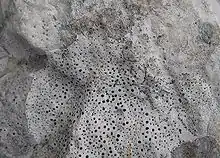Verrucariales
Verrucariales is an order of ascomycetous fungi within the subclass Chaetothyriomycetidae of the class Eurotiomycetes. Although most of the Verrucariales are lichenised,[1] the family Sarcopyreniaceae consists of 11 species of lichenicolous (lichen-dwelling) fungi.[2]
| Verrucariales | |
|---|---|
 | |
| Unidentified specimen of Verrucaria | |
| Scientific classification | |
| Domain: | Eukaryota |
| Kingdom: | Fungi |
| Division: | Ascomycota |
| Class: | Eurotiomycetes |
| Subclass: | Chaetothyriomycetidae |
| Order: | Verrucariales Mattick ex D.Hawksw. & O.E.Erikss. (1986) |
| Families | |
Phylogenomic analysis suggests that the divergence between the lichenized Verrucariales and nonlichenized Chaetothyriales occurred about 131 million years ago.[3]
Genera of uncertain placement
There are some genera in the Verrucariales that have not been placed with certainty into any family. These are:[4]
- Botryolepraria Canals, Hern.-Mar., Gómez-Bolea & Llimona (1997) – 2 spp.
- Gemmaspora D.Hawksw. & Halici (2007) – 1 sp.
- Kalbiana Henssen (1998) – 1 sp.
- Merismatium Zopf (1898) – 10 spp.
References
- Gams, Walter; Diederich, Paul; Pöldmaa, Kadri (2011). "Fungicolous fungi". In Greg M. Mueller; Bills, Gerald F.; Foster, Mercedes S. (eds.). Biodiversity of Fungi: Inventory and Monitoring Methods. Academic Press. pp. 343–392. ISBN 978-0-08-047026-9.
- Diederich, Paul; Lawrey, James D.; Ertz, Damien (2018). "The 2018 classification and checklist of lichenicolous fungi, with 2000 non-lichenized, obligately lichenicolous taxa". The Bryologist. 121 (3): 340–425. doi:10.1639/0007-2745-121.3.340. S2CID 92396850.
- Wang, Yan-Yan; Liu, Bin; Zhang, Xin-Yu; Zhou, Qi-Ming; Zhang, Tao; Li, Hui; Yu, Yu-Fei; Zhang, Xiao-Ling; Hao, Xi-Yan; Wang, Meng; Wang, Lei; Wei, Jiang-Chun (2014). "Genome characteristics reveal the impact of lichenization on lichen-forming fungus Endocarpon pusillum Hedwig (Verrucariales, Ascomycota)". BMC Genomics. 15 (1): 34. doi:10.1186/1471-2164-15-34.
- Wijayawardene, N.N.; Hyde, K.D.; Dai, D.Q.; Sánchez-García, M.; Goto, B.T.; Saxena, R.K.; et al. (2022). "Outline of Fungi and fungus-like taxa – 2021". Mycosphere. 13 (1): 53–453. doi:10.5943/mycosphere/13/1/2. S2CID 249054641.
This article is issued from Wikipedia. The text is licensed under Creative Commons - Attribution - Sharealike. Additional terms may apply for the media files.